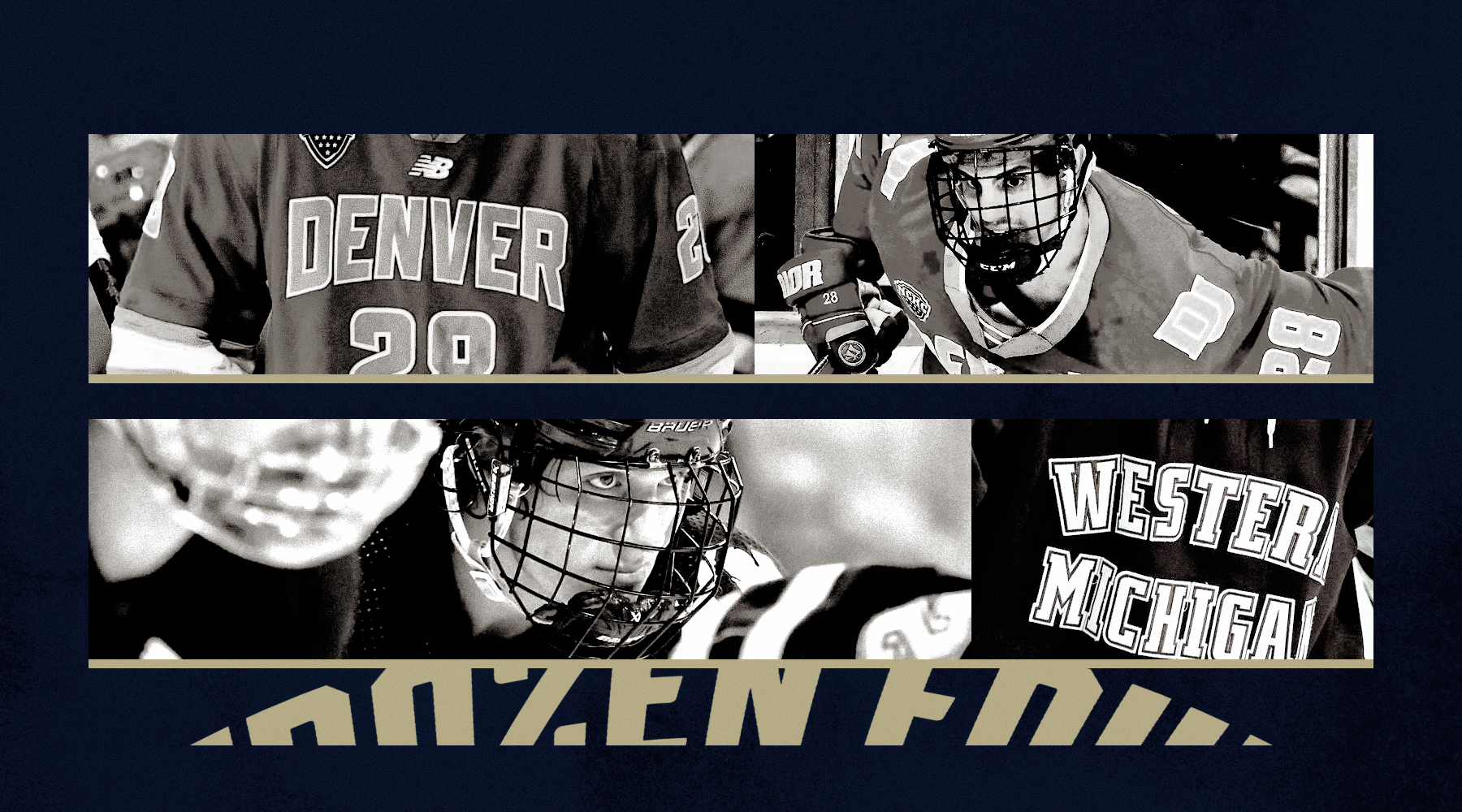Frozen Four preview: Western Michigan trying to deny Denver repeat

Last season, Denver won the national championship for the 10th time. No school in the history of Div. 1 college hockey has more.
Many of the players who powered that title — also the Pioneers' second in their seven years under coach David Carle — are still with the club, and with those players come a host of individual accolades to go with the team success. They may be the lower seed, but there wasn't a team in the tournament who could best Denver in terms of postseason success; two current players were on both of Carle's national-championship teams and would love to deliver a third in four seasons.
This is Denver's sixth trip to the Frozen Four in just nine tries, a run of success one could only ever hope to aspire to. And for them, just another Thursday game in April. Ho hum.
The path to this part of the season has not been nearly as smooth for Western Michigan. A program that has been in Div. 1 for almost 50 years, the Broncos have never been this deep into the NCAAs and, in fact, only made the national tournament six times before Pat Ferschweiler took over four years ago. They've made it every year since.
But for Ferschweiler, and the program, this is uncharted territory. Only one team in program history has as many wins as this year's total of 32, and if you're reaching back to 1985-86 to find comparables, you might as well reach back to ancient Egypt. Simply put, not Western Michigan team has ever been this good, this consistently. It's no fluke that they're here, but we just have no track record for how things will go once the puck drops. Denver has all the experience in the world at this stage; Western literally has none.
And so here is Western Michigan, the upstart team, standing athwart its conference rival, having beaten them back in both the regular season and the NCHC tournament, and trying to put themselves in a position to do more than make history. They're trying to do what so many Denver teams have done over the decades, and become immortal.
Let’s get into the matchups:
No. 4 Western Michigan Broncos (32-7-1) vs. No. 9 University of Denver Pioneers (31-11-1)
The interesting thing when it comes to these two teams is that we have a lot of basis for comparison between them for this season. Since they are in the same conference, their record against common opponents is going to have a lot of sample size; in those games, WMU went 23-4-1, and Denver went 19-8-1.
We of course also have the head-to-head matchups. Although there were only three games, and all of them were played at Western's Lawson Ice Arena in Kalamazoo, it feels notable that Western went 2-1, and the only loss was in overtime. One of the wins was in double overtime for the NCHC championship just a few weeks ago, too.
The storyline
This is as straightforward as it gets: The Pioneers want revenge for Western winning both NCHC trophies this year. Hey, they let the regular-season title get away from them, but the Pioneers have to feel like they had the postseason championship in their hands, only to have it snatched away. They don't cough up third-period leads often. And it basically never happens when they're up three goals with 20 minutes to play.
While Denver was statistically the better team in the regular-season matchup, Western came back from down three goals in the third period to win 4-3 after 80:22 of hockey, and outshot the Pioneers 50-29 in doing so.
With their level of experience and how badly they will want one more trophy before a bunch of their principal players leave for the pros, expect Denver to be out for blood, and Western to be more than game for the challenge.
The potential matchups
Below are the season-long stats (via InStat) for the lines used in both teams’ most recent games. Let's start with higher-seeded Western Michigan. Stats are in all situations:
As you can see, a lot of these guys have spent quite a bit of time together, and mostly had some pretty robust success. That top line of Alex Bump, Matteo Costantini, and Owen Michaels combined for 47 goals this year, but just as importantly, did a lot to push opponents around. It's all well and good to score 75 percent of the goals when you're on the ice; it's quite another to take over 68 percent of the shots on goal as well. At about 93 shot attempts per 60 minutes in all situations, opponents were basically under withering gunfire when those three were on the ice.
Problematically for Denver, though, WMU is hardly a one-line team. Liam Valente, Grant Slukynsky, and Zach Nehring didn't post the same kind of underlying numbers as the guys above them in the lineup, but they have a total of 37 goals, which is nothing to sneeze at. And the fact that their third line has 30 is a big reason why nobody scored more goals than the Broncos this year. Their fourth line didn't rack up the goals, but
On the back end, you can see that Western found what they liked early and stuck with it basically all season. You never see three pairings with at least 500 minutes together, but here we are. And all the underlying numbers are basically the same, except to say that the middle pair of Brian Kramer and Cole Crusberg-Roseen grade out a little better while Samuel Sjolund and Joona Väisänen ground up the top competition.
Everyone left standing at this time of year is generally going to range between "elite" and "quite good," but it's rare full lineups have this much time together while doing it.
Let's move on to Denver, based on the line charts in their most recent game:
A good chunk of Denver's offense is a little more concentrated on its top two lines than WMU's. Aidan Thompson, Carter King, and Jack Devine combined for 54 of Denver's 172 goals, and the "second" line of Sam Harris, Samu Salminen, and James Reeder had another 44. Meanwhile, the Pioneers' two best defensemen scored more goals than any combination of three players on either of their bottom two forward lines. Which isn't a knock on those guys, because they're doing what the team asks of them and you can look at the numbers; they tend to do it pretty well. If you're trying to find a lane of attack to say, "Maybe Denver doesn't have it," and you're pointing to some poor underlyings for a fourth line that doesn't even get outscored, you're in a bit of trouble.
Especially because we know their two best defensemen are arguably among the three or four best in the entire country. Zeev Buium is a Hobey finalist for good reason. Eric Pohlkamp would potentially be in that conversation if Buium somehow weren't. There's basically no drop-off between them, taking things as a whole.
But you'll notice that Pohlkamp only has 59 minutes with his partner, Cale Ashcroft, in which things were maybe a little rockier than you'd expect (though they still outscored opponents 3-2). That's because his regular partner, Boston Buckberger, got hurt in the first overtime of the NCHC title game against WMU and is out for the season. Pohlkamp and Buckberger played hundreds of minutes together and outscored opponents 39-18, more than 68 percent of the goals. Not to dwell on it, but Buckberger had 9-21—30 in 41 games. That's a huge piece to lose.
And yet, against Providence and BC, it felt like they hardly missed a beat. Buium and Kent Anderson remain a reliably dominant presence that will be tough for Western to crack.
The goalie duel
The obvious thing to say here is that Matt Davis is god-mode in the NCAA tournament; five goals against and a .976 save percentage in six career games. All you can say is, "Good luck," especially because it's very much not a case of him simply being a systems goalie. He's facing 30-plus shots per game in that stretch, but he's won every single one of them.
If you're Western, you have to ask yourself, "Why would he stop now?"
He wins goalie duels against the stingiest teams, with Richter nominees opposite him, on a regular basis. He shuts down high-flying offenses with ease. But has he faced an offense this high-flying? The Broncos did get to him for nine goals on 92 shots in three games this year, so that's maybe something, but I also tend to think that's not really a thing from which you can extrapolate much. But you gotta look for any mental edge you can find, and if you're landing on "we got him to just .902 this year," it's better than abandoning all hope.
At the other end, Hampton Slukynsky got the start in two of the three games against Denver, and didn't fare much better (1-1 with six goals allowed on 63 shots), but the limited action is the story here. The freshman split time for the vast majority of the season before finally taking the reins all to himself a little before the playoffs started. In his 11 consecutive starts since then, Slukynsky is 10-1 with an .899 save percentage. And while we shouldn't want to trim down sample sizes as a general rule, it must be noted that stretch includes a few iffy starts in a row back in late February. Since the NCHC playoffs began, it's more like 6-0 with a .931, which is much more reassuring. That includes the double-OT win over Denver in the conference title game, in which he stopped 26 of 29.
Tough to bet against Davis, or Denver as a whole, just because of the track record. But nobody they've played in the NCAA tournament these last two years knew them as well as Ferschweiler's team does. They might have the chess moves to make something happen.
And if they don't, well, it's Denver. This is kinda their time of year.
